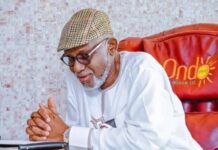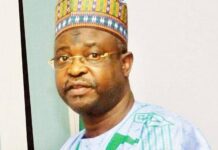By Chris Paul Otaigbe
She Sewed the Old Days, recreating herself as the oral artist of the ‘womanness’ of the word that is literature and literary way of life. Resisting the societal directive to spin on the axis of maleness, she moved beyond boundaries to celebrate sisterhood on the global stage and assert the ‘STIWA of God’s creation. She is Molara Ogundipe-Leslie and she has left us to continue her apostacy of the essence of womanhood before her Maker.
Molara left our earthly shores at 78 on June 18 at her native land of Ijebu Igbo, Ogun State.
Born in Lagos, to a family of educators and clergy. Abiodun Omolara Ogundipe graduated (BA English Honours) as the first Nigerian with a first-class degree from the University of London.
She later earned a doctorate in Narratology (the theory of narrative) from Leiden University, one of the oldest universities in Europe.
She taught English Studies, Writing, Comparative Literature and Gender from the perspectives of cultural studies and development at universities in several continents, and was also a Professor of English and Comparative Literature at the University of Port Harcourt, Rivers State Nigeria.
In a male-dominated, artistic field concerned about the problems afflicting African men and women, young Molara had begun to assert her dominion of her own space on the turf. Little wonder she rose to prominence early in her career.
Mrs. Ogundipe Leslie took the front seat at the front row of the theoretical dynamism unfolding within African feminism. With a powerful and deeply ingrained cultural understanding of the dynamics of gender relations in the pre-colonial and colonial Yoruba society, which became a pivot for theory, she had, over the years, turned a critic of the oppression of women, arguing that African women are more oppressed in their status and roles as wives.
She made this assertion in view of their multiple identities, in some of which identities they enjoy status, privilege, recognition and agency. She criticized the plight of African women as due to the impact of imposed colonial and neo-colonial structures that often place African males at the height of social stratification.
Their plight is also due to the internalization of patriarchy by African women themselves. She, however, insisted on an understanding of the complexity of the statuses of African women in their pre-colonial and indigenous cultures for any useful discussion or study of African women.
A Nigerian scholar, critic, educator and activist Ogundipe-Leslie is recognized as one of the foremost writers on African women and feminism. She argued for an African-centred feminism that she termed “Stiwanism” (Social Transformation in Africa Including Women) in her book Recreating Ourselves. A distinguished scholar and literary theorist, she published numerous works of poetry and literary criticism in addition to STIWA.
Stiwanism is concerned with seven principles:
“STIWA” 1) resists Western feminism
2) gives specific attention to African women in this contemporary moment
3) brings to the forefront indigenous feminism that has also existed in Africa
4) believes in both inclusion and participation in the socio-political transformation of the African continent
5) contends with a woman’s body, personhood, nationhood, and society and how it operates within socio-economic hierarchies
6) is intentionally specific to the individual and collective identity ( ie. religion, class, and marital status)
7) recognizes that there are many factors and identities in Africa and individual personhoods operating in different and contradictory ways.
· Among her other works are: Sew the Old Days and Other Poems, 1985
· Re-Creating Ourselves: African Women & Critical Transformations, 1994
· (ed.) Women as Oral Artists, 1994
· (ed. with Carole Boyce-Davies) Moving Beyond Boundaries. April 1995 (two volumes).
· Gender and subjectivity. Readings of “Song of Lawino”.
Dissertation Leiden University. Leiden, CNWS, 1999
Earlier in her career, Ogundipe had posited that a true feminist writer had to understand or describe effectively a woman’s viewpoint and how to tell the story about a woman. She strongly believed that rediscovering the role of women in Nigeria’s social and political institutions may be the best way to improve those institutions.
She was known as a writer whose works capture most vividly the complexities of African life. In Re-Creating Ourselves: African Women and Critical Transformations, she wrote brilliantly about the dilemma of writing in her traditional language and men’s resistance to gender equality. Through the vast literary experiences and many gender-related writings, Molara Ogundipe provided “intricate oeuvre” which enable African feminists engage in bringing meaningful changes in issues related to gender, family and society that can drive national and continental development.
Molara knew the prejudices against the feminine goes deeper than what mere intellectual bantering can unravel and so she pushed the envelope that propounds the need for serious arguments that peel away at the layers of prejudices and biases.
Her turgid framework of arguments, at the intersection of the postcolonial, the continental and the diasporic, outline Africa’s cultural experience as the basis from which to transform the feminine experience.
Professor Ogundipe is not just a critic of masculine excesses. She is not just a poet that laments the imminent loss of femininity. She is an activist-creator buoyed by an optimism of a renewed understanding of what it means to be a woman within an African cultural context. Molara Ogundipe’s literary, intellectual and cultural sensibilities are geared towards a recalibration of what feminism can be transformed into, in Africa.
Her contribution to the conversation on the woman and her place in the community, her creation of the discourse designed to position and protect the space of the woman in the context of social transformation has got even the Politicians to recognize her point of view.
So, none other than the President of Nigeria, Mohammadu Buhari, was moved to press the point home, in mourning Prof. Molara Ogundipe-Leslie.
In a condolence message issued by his Senior Special Assistant on Media and Publicity, Malam Garba Shehu, in Abuja on Friday, Buhari also condoled with family members, friends and professional colleagues of the cerebral scholar, literary theorist, and columnist.
The president noted that Ogundipe-Leslie’s exceptional brilliance and contribution to scholarship in Nigeria, and many countries of the world would always be remembered.
He affirmed that her expositions on gender consciousness, inclusivity and culture would always be relevant in planning for development in the country.
The President commended Ogundipe-Leslie for dedicating her life to research, teaching, and writing, particularly establishing the Foundation for International Education and Monitoring, which was focused on encouraging young women to play active roles in society.
Those who may be encountering Molara, merely on the Pages of Newspapers, or Books, may not fully appreciate the person of the Professor than those who had the privilege of a lifetime learning, in real life and real time, under the tutelage of the Literary giant.
One of her students and her name sakes, Omolara Akin-Taiwo belonged to the 83/87 set ENGLISH DEPT, Ogun State University, now Olabisi Onabanjo University.
In her tribute to the great Teacher and icon, titled: Molara Ogundipe-Leslie: Goodnight my Teacher, published on June 22, 2019 in PM news online, Mrs. Akin-Taiwo said Mrs. Ogundipe-Leslie lived life on her own terms. She stated: “I first encountered her as a 2nd year student at the Ogun State University, Ago-Iwoye as an English student. I will always remember her and the memories we shared. She taught me or better to say didn’t teach me Poetry. Dr Leslie did not teach her students; according to her she gives you the “tools to learn and you do research on your own”.
According to student Omolara, Professor Molara Leslie was ahead of her time as a teacher also apparently because of her exposure to western way of teaching.
“Dr Leslie as she was called at that time was a hard scorer. She called my name in class because I had the highest score of 52% in the assignment she had given. Once she called my name and I stood up she retorted “so you are the one who have the audacity to bear my name.” that threw the class into an uproar of laughter.
Despite the fact that students didn’t like her initially she had a knack for saying things that just made everyone laugh. She asked to meet me in her office and from then a guarded respectful lecturer-student friendship was borne. Soon enough she thrusted me into “Graduate Assistantship” for the Poetry class. I was assigned the task of giving assignments to my peers, reading and discussing the poems with the class and reporting back to her which sometimes were done at her home. I did my best with the responsibility but back then I felt it was a case of the blind leading the blind”.
In hindsight, Omolara appreciates cutting her teeth at that early stage of her life in some sort of leadership and tutelage as it has served and continues to serve her journey in life.
“Dr Leslie believed and invested in young people, in spite of my protest as a result of my feeling of inadequacy she refused to relieve me of the responsibility.
Dr Leslie was quite different from any lecturer. She mixed freely with some of her students and took us as protegees. I recall countless visits by her to my little room off campus.
I recall our trips alongside my friend Sola Adewunmi to University of Ibadan, Guardian Newspaper and NTA at Victoria Island where we met the likes of Dr Victoria Eze-Okoli? former Director of Productions, NTA and all her efforts to get us into media outlets so we can have some experience in the Broadcasting Industry.” Stated Omolara.
According to her, Dr Leslie’s carefree attitude which was termed extreme by some could be seen by all at Ogun State University as she would sometimes show up at students’ parties with no care about what anyone thought of it. She was a feminist who believed in the independence of the female gender.
“Dr Leslie was extremely prudent with money she was an Ijebu woman to the core. Her request at every visit to my room was for a bottle of 7 up. I finally asked her one day why 7Up and not Coke or Fanta? She quipped “because it contained more than the rest for the same price.” She joked.
Dr Leslie was a Pan-Africanist who believed so much in Africa, promoted African culture, books written by African authors and ideology. Dr Leslie can often be spotted wearing Adire or Ankara and mostly adorn African hairdos.
Omolara’s last physical contact with Molara was at the Marriot Hotel in Washington D.C where the Literary icon was a participant in a lecture series. By this time, she had dropped the Leslie, ended her Professorial job at Arkansas and was heading to Europe for another Professorial appointment. They exchanged a few emails after that.
“I remember her as a mother who loved to work, travel and spoke fondly of her daughters. I am privileged to have known her closely and to proudly say good night to my teacher, friend and mentor.
As I look back, I appreciate the enriching experience of travel, of exposure, the political talks and debates that ensued among us; the disagreements over faith and feminism during those visits, trips and encounters with you, they are in part the reason I am who I am today.
Thank you for the impression you left on my mind as an activist, speaker and writer and may your soul rest in peace Dr Omolara Ogundipe Leslie.”
Need one say more, but to wish the STIWA Apostle a peaceful rest, where her Maker would be on hand to bless her work on earth with an immortality that spans across age and beliefs on the question of the essence of the African woman.











